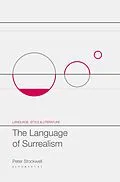The Language of Surrealism explores the revolutionary experiments in language and mind undertaken by the surrealists across Europe between the wars. Highly influential on the development of art, literary modernism, and current popular culture, surrealist style remains challenging, striking, resonant and thrilling - and the techniques by which surrealist writing achieves this are set out clearly in this book. Stockwell draws on recent work in cognitive poetics and literary linguistics to re-evaluate surrealism in its own historical setting. In the process, the book questions later critical theoretical views of language that have distorted our ideas about both surrealism and language itself. What follows is a piece of literary criticism that is fully contextualised, historically sensitive, and textually driven, and which sets out in rich and readable detail this most intriguing and disturbing literature.
Autorentext
Peter Stockwell is Professor of Literary Linguistics at the University of Nottingham, UK.
Inhalt
PART I: THE ORIGINS OF SURREALISM
1. The pre-history of surrealism
2. The biography of surrealism
3. Language in surrealist thought
PART II: WRITING SURREALISM
4. Automaticity
5. Collage
6. Dissonance
PART III: READING SURREALISM
7. Coherence and confusion8. ambient experience
9. Disorientation
PART IV: TAMING SURREALISM
10. Surrealism in the service of the world.
